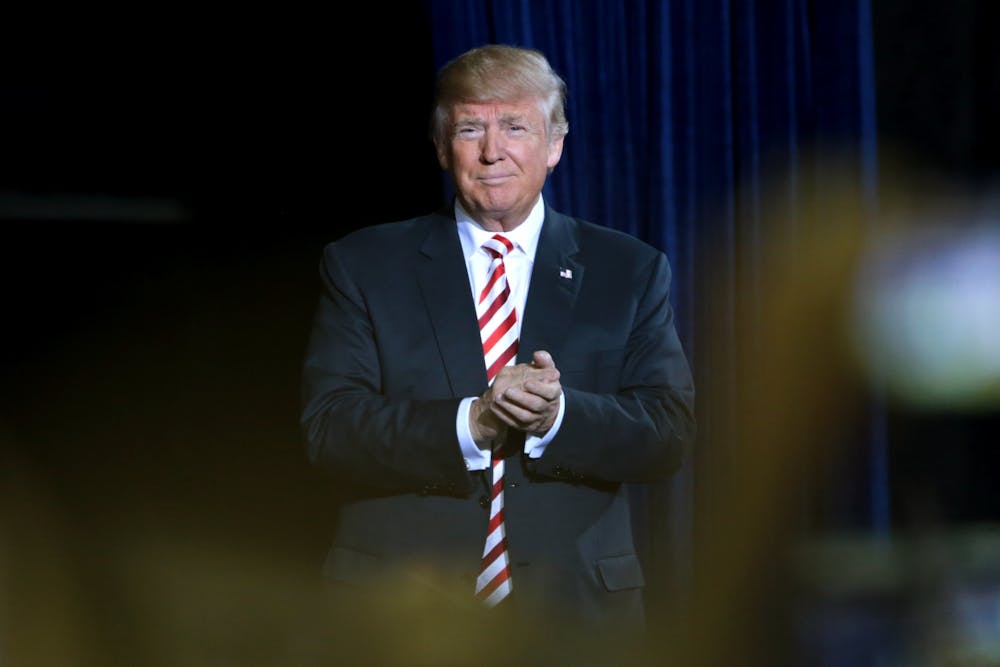By Gauri Patel
Staff Writer
A federal grand jury in Washington, D.C. has reindicted former President Donald Trump on charges related to his alleged attempts to undermine the results of the 2020 presidential election. The new indictment was brought by Department of Justice Special Counsel Jack Smith in an effort to comply with a landmark Supreme Court ruling on the matter, according to The Associated Press.
This comes after the Supreme Court ruled on July 1 that former presidents have broad immunity from criminal prosecution for official acts taken while in office. As a result, certain allegations of the special counsel’s original indictment could not proceed, as they fell within the scope of his powers as president.
The revised indictment contains the same four felony charges brought against Trump last year, including conspiracy to defraud the U.S., conspiracy to obstruct an official proceeding, attempting to obstruct an official proceeding and conspiracy against the right to vote, according to The Associated Press.
However, allegations were removed to focus on the distinction between his private actions taken as a political candidate seeking reelection, which can be the subject of criminal charges, and his official actions taken as the president at the time, which are subject to immunity.
The election interference case was sent back to U.S. District Judge Tanya Chutkan, who will sift through Trump’s allegations to separate official acts and private acts and decide which allegations will proceed. This process may further stall the case for months, and it appears unlikely to reach court before the presidential election on Nov. 5, according to Reuters.
One of the most significant changes to the new charging document, which was shortened from 45 to 36 pages, was the removal of claims that Trump attempted to push the Justice Department to spread false claims about election fraud, according to The New York Times. It removes references of Jeffrey Clark, a senior Justice Department official who allegedly was one of six co-conspirators in Trump’s attempts to overturn the 2020 election results. Prosecutors have alleged that Clark had promised to conduct sham election fraud investigations and to falsely inform states of fraudulent election results.
However, following the Supreme Court’s ruling, Trump will not face charges concerning these dealings, as his actions with the Justice Department are considered official duties within his constitutional powers as president. The revised indictment also removes details about Trump’s communications with senior White House attorneys and certain government officials who allegedly told Trump his election fraud claims were false.
Despite these changes, the revised indictment retains allegations that Trump mobilized slates of fraudulent electors in key swing states to sign certificates falsely attesting that he won in those states instead of President Joe Biden. It also maintains allegations that Trump pressured former Vice President Mike Pence to reject legitimate electoral votes from states that Trump lost as Pence presided over the ceremonial certification of the election results on Jan. 6, according to Reuters.
"The defendant had no official responsibilities related to the certification proceeding, but he did have a personal interest as a candidate in being named the winner of the election," the revised indictment states.
Trump criticized the new indictment in a statement on his Truth Social media platform and called for it to be dismissed “immediately.” He also claimed that the Justice Department bringing the revised indictment was a violation of the '60-day' rule, an unofficial practice aimed at avoiding investigative action 60 days before an election. Although Justice Department officials caution against taking actions that could interfere with an election outcome, the so-called rule is not written in formal policy.
This case, one of four criminal prosecution cases faced by Trump, is back in the hands of Judge Chutkin. Both Smith and Trump’s team are scheduled to return to the courtroom to propose a path forward.







